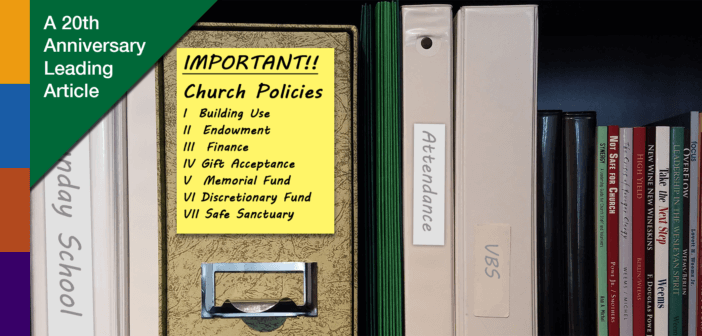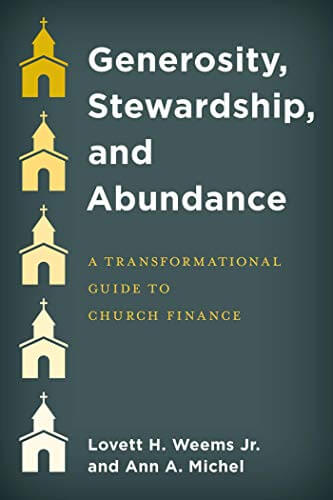Trust is fragile, says Bonnie Ives Marden. And finances, if not handled correctly, can be a source of worry rather than security. She outlines seven policies for institutional trust and financial integrity that reduce confusion and conflict while at the same time encouraging generosity to support your mission.
To celebrate the Lewis Center’s anniversary, we are highlighting Leading Articles — some of our most popular posts of the past 20 years. We are pleased to share again this article by Bonnie Ives Marden, originally published on Feb. 27, 2019.
Every church can benefit by having these policies in place.
1. Building use policy
When a group uses church property, a building use policy clarifies expectations about access to the property and use of facilities, such as food preparation, sound systems, worship space activities and supplies, set-up and clean up expectations, safety, and insurance verification. Information on fees, keys, and emergency contacts are important policy elements. Any user needs to align with your missional purpose and to provide a binder documenting appropriate insurance coverage. Uses that are not missional could trigger taxes for unrelated business income. Property use may generate significant income, and careful attention to nonprofit regulations and legal considerations will reduce potential risks.
2. Endowment policy
Language contained in your endowment policy should include a description of membership, the purpose of the endowment, an investment policy, and guidelines for amending the policy. Also known as a charter, the policy defines the goals, framework, and identified priorities for an endowment in your mission. Because of the legal responsibilities and financial accountability for managing invested assets and endowments, the policy contains language similar to language used in bylaws. Legal counsel is recommended to ensure that this policy complies with state laws impacting investments, endowments, and charitable giving by nonprofit organizations.
3. Finance policy
These policies provide instructions for creating the budget, opening bank accounts, managing transactions, record keeping, and other aspects of financial management; your finance policies orient leaders to mission procedures and expectations. While roles and responsibilities for financial management may be defined by denominational guidelines, these policies provide supplemental guidance for local operations.
4. Gift acceptance policy
This policy offers donors and committees guidance about the types of gifts accepted and how different types of gifts are stewarded, including refusing certain gifts. Especially appreciated by major donors, the policy provides helpful guidance describing whether valuable items or property could be donated to your mission. This policy helps your mission avoid gifts it can’t use.
5. Memorial fund policy
Memorial funds receive gifts honoring a person’s life. The memorial fund policy describes the purpose and stewardship of gifts, appropriate uses, and local traditions. Input from family members may be invited; however, the church retains the right to adopt or reject suggestions. Since families and members cannot create new designated funds, their input does not supersede the church’s authority to make the final decision. Affirm the life and values of the lives honored by having a plan and avoiding accumulating memorial funds without a clear plan or process.
6. Pastor’s discretionary fund policy
This designated fund is often available to pastors for special needs or pastoral care emergencies. Models for funding, managing, and distributing discretionary funds vary. Pastors should never be sole signatures on a discretionary fund account because this practice puts both the church and the pastor in a position of unnecessary risk and temptation. It is the church’s responsibility to protect both its assets and leadership. Periodically review the fund management system to ensure that all parties understand the procedures and that the pastor is protected from tax or misappropriation risk.
7. Safe sanctuary and limited access policies
Faith communities set expectations about protecting children, youth, and other vulnerable persons by adopting a Safe Sanctuary policy with guidelines for supervision, adult-child ratios, and transportation. Annual review and revisions, as well as ongoing education, are necessary after adopting a policy. In situations where previous violations of trust, convictions of illegal actions, or status as an offender of some sort exist, customized agreements or covenants set expectations for any level of access or activity. Such covenants need ongoing supervision and vigilance; they set appropriate boundaries seeking safety for all persons. This policy is included because it is a best practice to reduce the financial and legal consequences of violations of trust or misconduct.
These policies protect all parties and provide important guidance when those in leadership have questions or find themselves in situations requiring difficult decisions or choices. However, the usefulness of these policies is limited by the leadership’s use of them.
Annual review of all policies is an important discipline to practice and necessary to ensure that awareness and actions align with adopted plans and expectations. As legal requirements and regulations change and vary by state or region, always consult local professionals for any necessary modifications or adaptations.
 This material is excerpted from Church Finances for Missional Leaders: Best Practices for Faithful Stewardship (2019 by the General Board of Higher Education and Ministry) by Bonnie Ives Marden. The book is available at Cokesbury and Amazon.
This material is excerpted from Church Finances for Missional Leaders: Best Practices for Faithful Stewardship (2019 by the General Board of Higher Education and Ministry) by Bonnie Ives Marden. The book is available at Cokesbury and Amazon.
Related Resources
- Assuring Financial Integrity, an online course from the Lewis Center’s Keeping Our Sacred Trust ethics training series
- Protect, Sustain, Grow: Best Practices For Handling Your Church’s Money, a Lewis Center video tool kit
- 9 Questions to Assess Your Church’s Financial Health by Lovett H. Weems, Jr.
If you would like to share this article in your newsletter or other publication, please review our reprint guidelines.







